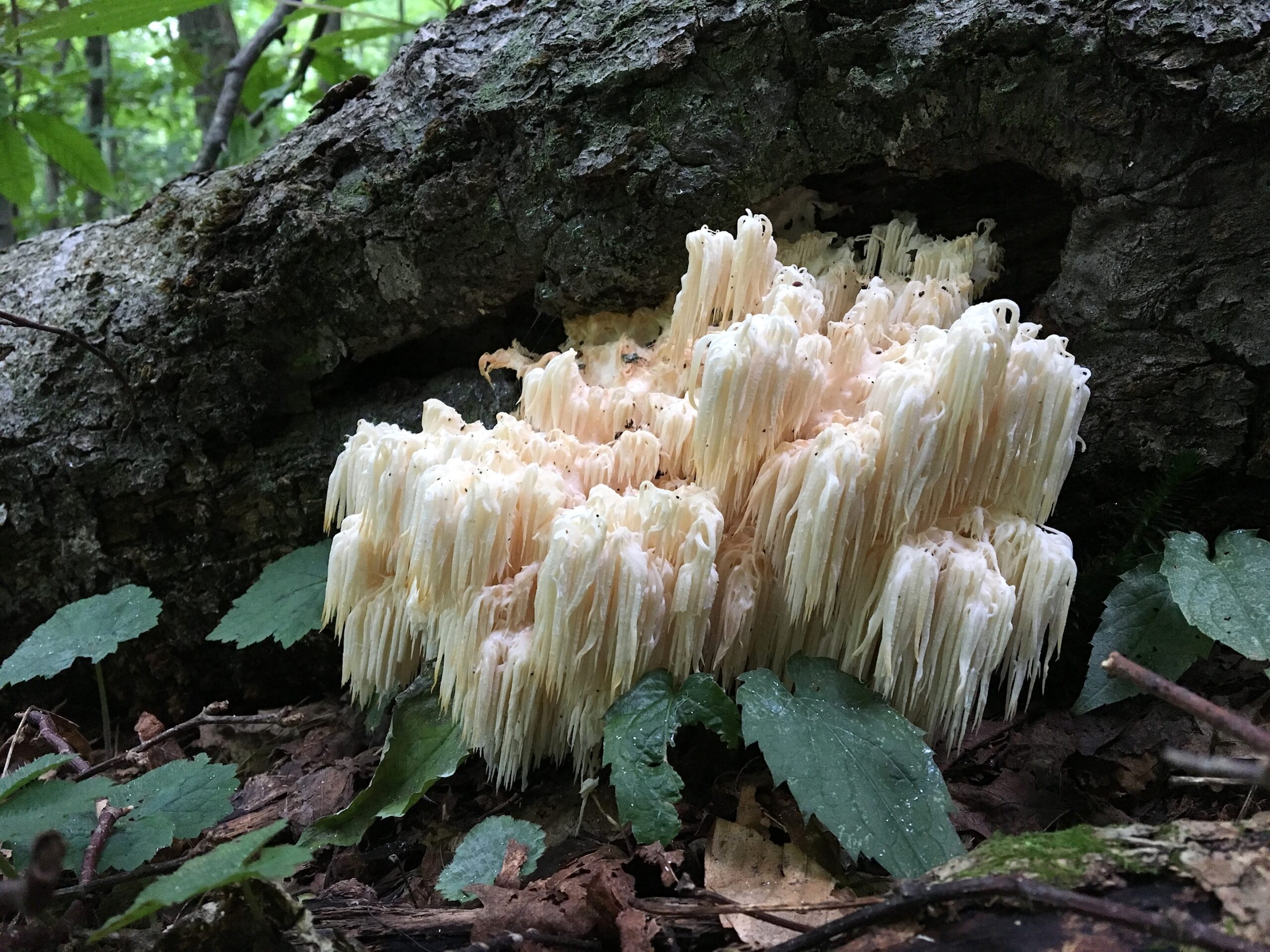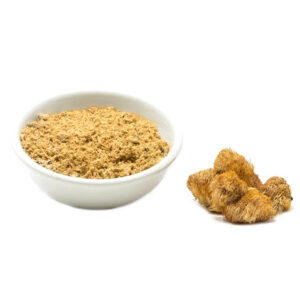
Introduction
Lion’s Mane mushrooms (Hericium Erinaceus) are mushrooms with white color,
long shaggy spines, which look like lion’s mane very much when they grow.
This mushroom grows in fallen hardwood trees mostly in Asia. It can be used in culinary or medical ways, but our point is about medical uses of this mushroom as supplement form or other medics.
The history of using this mushroom refers to traditional eastern Asian, like Japanese people who used herbalism way for healthcare, they made tea by the Lion’s Mane mushroom.
Nowadays scientific researches proved that Lion’s Mane mushrooms contain several bioactive compounds, including resorcinol, Hericenones (isolated fruiting body), steroids, Erincine, Hericerin, and mono- and diterpenes.
It has also health-promoting substances like beta-glucans and antioxidants that can enhance the level of the immune system of the body and protect the body from cancers. so the Asian called it tonic mushroom.

Recent studies show that the extract of this mushroom has digestive and cognition benefits, so it becomes more popular all entire the world and many people take supplement form of it.
The researches indicate extraction of this fungus may stimulate the synthesis of Nerve Growth Factor (NGF) and accelerate the myelination (making structure that covers the nerve cells) so, it can strengthen your memory and improve your mood.
On the other hand, proponents claim that the Lion’s Mane mushrooms can help the variety of health problems like Alzheimer’s disease, anxiety, depression, inflammation, etc.
The best way to use this fungus is extracting it by hot water because the active and useful compounds are inside the cell walls and like other mushrooms, the cell wall composed by indigestible fiber called chitin so, the only way to benefit is hot water extraction.
Does it have any effects on brain’s functions?

To answer this question we should refer to the experiment, which was done in 2009 by some Japanese scientists. In this study about 30 adult people (50-80 years old) with mild cognition’s failure to take either Lion’s Mane mushroom extract, or placebo for 4 months. the cognitive tests given in second, third, and fourth month revealed, that the group who took 100 mg of the Lion’s Mane mushrooms three times daily, had remarkable progress in their condition, compared with the group who took the placebo.
Besides this mushroom can stimulate NGF synthesis in the body, which this effect comes from these active compounds: erincines and hericerins.
NGF stimulates the rebuilding and growth of the nerve cells. So it can be useful for some neurodegenerative disorders like Parkinson and Alzheimer’s disease.
NGF also can improve and enhance synapse (the place where two neurons met) potentiation.
Recently an in vitro experiment has done (published in Biomedical Research in 2011), in that experiment researchers studied the effects of this fungus on the rats. It showed this mushroom can help memory function caused by amyloid-beta synthesis. Also, it may have a neuroprotective effect contrary to ischemic stroke.
In another study on mice, scientists found that this mushroom may speed up the brain’s injury recovery time, by 23-41% when the rats got nervous system injuries.
So what about mental conditions and mood?

About one-third of people in the developed country suffering from anxiety and depression.
These thoughts, that this mushroom can help mental problems, came to researchers’ minds when they observed menopausal women, who took Lion’s Mane mushroom extracts had less anxiety and lower irritation level.
After that, there was a study, that 30 females with a lot of complaints and no specific diseases took part. After 4 weeks of taking 500mg of that powder for some of them and taking a placebo for the rest of them, and they show the Lion’s Mane group had improvement in the sleep qualities, and depression compared with a placebo group.
They think this effect is because of the anti-inflammatory effect, or the changes and regenerations on the hippocampus which is responsible for human mood.
In 2015, mice that consumed a Lion’s Mane mushroom displayed less depressive behaviors although some other researchers believed that it does not affect the human mood.
Does it help the digestive system?

Digestive ulcers could be found anywhere of digestive tracts including stomach, intestine, and colons. It is caused by bacteria like H.pylori in the stomach, or inflammation by a self immune system like ulcerative colitis, or inflammatory bile diseases (IBD), or by using excess nonsteroidal anti-inflammatory drugs (NSAID). So the Lion’s Mane mushroom can cure the ulcers with all mentioned causes.
In vitro studies show that the lion’s mane mushroom has an antibacterial effect so it can protect the stomach from infecting by H.pyloi bacteria. In some other studies, it was proved, that this mushroom extract has an anti-inflammatory effect so it can reduce inflammation in the gastric tract and can protect us from ulcerative colitis or inflammatory bowel diseases. This mushroom can also strengthen and maintain the mucus of gastric layers so that they reduce the side effect of nonsteroidal anti-inflammatory drugs and alcohol to damage this mucosal layer.
Does this mushroom have any other beneficial effects?
We should say, yes it does.
We are going to present to you some of these effects:
A. Anti-cancerous effect:
With antioxidant compounds in this mushroom, it can protect the body from the carcinogenic substance in the body. Some in vitro researches on mice that were published in the journal of agriculture and food chemistry in 2011 confess that it has a therapeutic effect on leukemia. In the other study with animal models, they found it may fight with liver, and colon cancers.
B. Heart’s health effects:
In another animal modeling experiment in the japan, scientists discovered, this mushroom can improve fat metabolism, and lowering the level of blood cholesterol. The hericenone B, which was made by the Lion’s Mane mushroom can inhibit platelet aggregation, and we know the platelet aggregation can increase the risk of thrombosis, which is the risk of myocardial infarction.
The test-tube study also shows that the Lion’s Mane mushroom can prevent attachment of the oxidation of cholesterol to artery walls.
C. Modulation of Diabetes:
The best way to control diabetes and its side effects are to maintain the blood sugar in the normal range. The Lion’s Mane mushroom extract can decrease the level of blood sugar. It was tested on the diabetic mice with a high level of blood sugar and used that extraction for 4 weeks, the result was amazing and they all got normal range blood sugar. It can also cure and relieve nerve pain, which is one of the diabetes side effects.
D. Boost immune system:
Lion’s Mane mushrooms may enhance the immune system, by reducing inflammation and preventing oxidation. It also can improve the digestive immune system, by regulating intestinal immune activity. Lion’s Mane can affect both cell-mediated and antibody-mediate immune function.
Another study claim that the protein in the Lion’s Mane mushroom can affect positively, strengthen, encourage the growth, and regulation of the healthy gut bacteria.
Is Lion’s Mane mushroom safe or it has side effects?
Until now there are no significant researches, which can prove the side effect of this mushroom. However we should be careful about allergic reactions to this mushroom, and we should consult with our physician before using it.
In the animal base studies, there was no adverse effect even in high dose usage of the Lion’s Mane mushroom in the experiments.
Conclusion
Animal modeling researches and experiments showed that the Line’s Mane mushroom has a lot of beneficial health effects but, these researches are too little to replace the Lion’s Mane mushroom extract and it’s supplements instead medical drugs, and use it for specific conditions. So self-treatment by these supplements without your physician’s consultation may have irrevocable complications.
* These statements have not been evaluated by the Food & Drug Administration.


